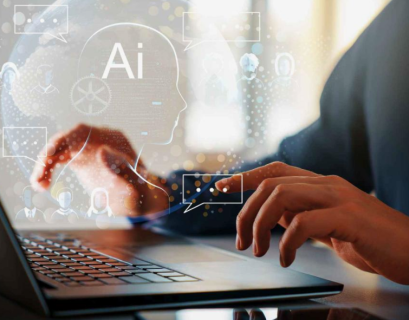Have you ever wondered how Artificial Intelligence (AI) is changing the way we manage our money?
Or perhaps you’re wondering if it’s safe to trust AI with your money?
With technology advancing so rapidly, it’s natural to have questions about how AI is transforming the world of finance and what it means for you.
Will it lead to better financial security, or could it create new challenges we aren’t prepared for?
The good news is that AI is revolutionizing the way we think about and interact with money, making financial services smarter and more efficient.
AI is already working behind the scenes in finance helping manage risk, predicting market trends, and offering personalized advice.
But are we truly ready for a future where AI is at the heart of financial decision-making?
This article will explore these questions and more, taking a closer look at how AI is shaping the future of finance.
The Rise of AI in Finance
AI is fundamentally changing the financial landscape by automating processes, improving efficiency, and delivering personalized financial services. At its core, AI analyzes vast amounts of data and makes informed decisions or recommendations based on patterns, trends, and real-time information.
This transformation is heavily reliant on the use of advanced devices like an AI computer that is designed to process enormous datasets and perform complex computations at lightning speed.
According to Google Cloud, AI in finance helps drive insights for data analytics, performance measurement, predictions and forecasting, and real-time calculations.
In finance, AI is not just a tool; it’s becoming an indispensable asset in various sectors, including banking, investing, insurance, and personal finance management.
Image source: medium
Key Areas Where AI is Impacting Finance
- Automated Trading: AI-driven algorithms can analyze market conditions and execute trades based on predetermined criteria. This allows for high-frequency trading and rapid responses to market changes, optimizing investment strategies for better returns.
- Fraud Detection and Prevention: AI systems utilize machine learning to identify suspicious patterns and detect fraud in real time.
- Personalized Banking: AI algorithms analyze customer data to offer personalized financial products and services. From tailored investment advice to customized loan offers, AI helps financial institutions provide services that better suit individual needs.
AI’s Role in Data-Driven Decision Making
At its core, AI’s influence in finance is deeply rooted in its ability to process and analyze large datasets in a fraction of the time it would take a human analyst. The future of money lies in data-driven decision-making, which is powered by AI algorithms that can assess risk, market trends, and customer behaviour more effectively.
According to WM, AI-powered machine learning models improve their decision-making by analyzing large datasets for patterns and trends.
Image source: dev.to
How AI Enhances Data-Driven Insights
-
Predictive Analytics:
AI uses historical data to predict future outcomes. For example, investment platforms leverage AI to forecast market movements, enabling traders to make more informed investment decisions.
-
Sentiment Analysis:
By processing text data from social media, news outlets, and financial reports, AI can gauge public sentiment and market reactions. This can help investors anticipate changes in stock prices based on public perception.
-
Risk Management:
Financial institutions use AI-powered risk management tools to assess potential risks in real-time. AI can model various economic scenarios and provide risk assessments, enabling better decision-making for investors and institutions alike.
AI in Personal Finance: Redefining the Relationship with Money
Personal finance is one of the most dynamic sectors benefiting from AI. Whether it’s budgeting, savings, or investments, AI is transforming how individuals manage their money, making financial planning more accessible, efficient, and intuitive.
Smart Money Management Tools
AI-Powered Budgeting Apps: Applications like Mint and YNAB (You Need a Budget) use AI to analyze spending habits, categorize expenses, and suggest ways to save money.
- These apps use algorithms that automatically update and optimize financial plans based on changing incomes and spending patterns.
Robo-Advisors: Robo-advisors, like Betterment and Wealthfront, use AI to provide personalized investment advice based on a user’s risk tolerance, financial goals, and preferences.
- These platforms automate the process of investing, making it easier for people to access high-quality financial advice without the need for a human advisor.
Automated Savings: AI-driven savings tools, such as Digit and Qapital, analyze users’ spending habits to automatically set aside small amounts of money for future needs.
- These tools ensure that individuals save money without having to think about it.
AI in Investment Strategies
As AI continues to disrupt financial services, its impact on investment strategies is particularly noteworthy. Traditionally, investing has been a complex field requiring significant expertise and analysis. With AI, individuals and institutions can now access smarter, data-driven investment options.
According to Intel, AI in finance improves speed and efficiency for key fraud detection, risk management, and analytics tasks.
How AI is Shaping Investment Decisions
Portfolio Management:
AI-driven portfolio management platforms analyze market conditions and automatically adjust portfolios to optimize returns based on current data. These platforms use advanced algorithms to diversify portfolios, rebalance assets, and manage risk without human intervention.
Algorithmic Trading:
AI enables algorithmic trading, where algorithms execute trades based on real-time data and market conditions. These algorithms can operate 24/7, capitalizing on short-term fluctuations in market prices and optimizing trading strategies.
The Future of Smart Finance: AI and Blockchain Integration
The future of smart finance lies in the integration of AI with emerging technologies like blockchain. Blockchain offers secure, transparent, and decentralized financial transactions, while AI enhances decision-making and analysis. Together, these technologies can create a highly secure, efficient, and automated financial ecosystem.
Potential Benefits of AI and Blockchain Integration
Enhanced Security: Blockchain’s decentralized nature combined with AI’s fraud detection capabilities will ensure that financial transactions are not only fast but also secure.
- AI can enhance the functionality of smart contracts, which automatically execute transactions when predefined conditions are met. By using AI to assess the conditions in real-time, blockchain-based financial systems can become more efficient and self-regulating.
- AI can be used to optimize cross-border transactions by predicting exchange rates, analyzing market data, and automating currency conversions.
Conclusion: The Smart Future of Money
The future of money is being written by AI, where smarter, more efficient financial systems are emerging at every turn. From personalized banking services to intelligent investment strategies, AI is reshaping how we interact with our finances.
As AI technologies continue to evolve, they will become an integral part of the financial sector, driving innovation and efficiency in ways we never thought possible. This change will lead to a more accessible and inclusive financial future.











